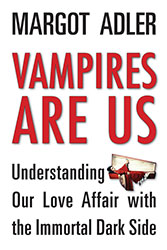 Margot Adler has written a volume titled Vampires Are Us: Understanding Our Love Affair with the Immortal Dark Side (Weiser Books, 2014). The synopsis and promotional statements include:
Margot Adler has written a volume titled Vampires Are Us: Understanding Our Love Affair with the Immortal Dark Side (Weiser Books, 2014). The synopsis and promotional statements include:
In a culture that does not do death particularly well, we are obsessed with mortality. Margot Adler writes, “Vampires let us play with death and the issue of mortality. They let us ponder what it would mean to be truly long lived. Would the long view allow us to see the world differently, imagine social structures differently? Would it increase or decrease our reverence for the planet? Vampires allow us to ask questions we usually bury.”
As Adler, a longtime NPR correspondent and question asker, sat vigil at her dying husband’s bedside, she found herself newly drawn to vampire novels and their explorations of mortality. Over the next four years–by now she has read more than 270 vampire novels, from teen to adult, from gothic to modern, from detective to comic–she began to see just how each era creates the vampires it needs. Dracula, an Eastern European monster, was the perfect vehicle for 19th-century England’s fear of outsiders and of disease seeping in through its large ports. In 1960s America, Dark Shadows gave us the morally conflicted vampire struggling against his own predatory nature, who still enthralls us today. Think Spike and Angel, Stefan and Damon, Bill and Eric, the Cullens.
Vampires Are Us explores the issues of power, politics, morality, identity, and even the fate of the planet that show up in vampire novels today. Perhaps, Adler suggests, our blood is oil, perhaps our prey is the planet. Perhaps vampires are us.
What People Are Saying
“An illuminating and fascinating work!”
—Starhawk, author of The Spiral Dance and The Fifth Sacred Thing“Insightful and compelling… as a tool for understanding the drift of human culture over the last two centuries. The ever-morphing vampire, powerful and at the same time significantly flawed, invites us to reflect on our own life as we seek control, community, and some sense of self-worth.”
—J. Gordon Melton, Distinguished Professor of American Religious History, Baylor University





There are no responses yet